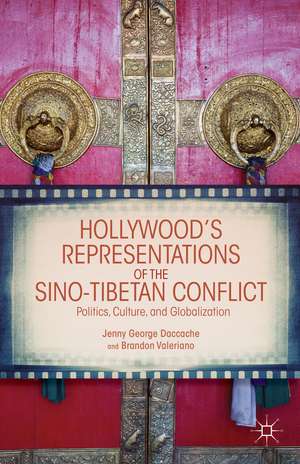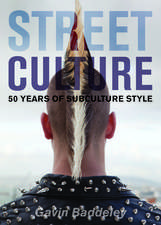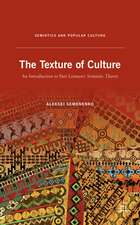Hollywood's Representations of the Sino-Tibetan Conflict: Politics, Culture, and Globalization
Autor J. Daccache, B. Valerianoen Limba Engleză Hardback – 5 dec 2012
| Toate formatele și edițiile | Preț | Express |
|---|---|---|
| Paperback (1) | 384.09 lei 6-8 săpt. | |
| Palgrave Macmillan US – 5 dec 2012 | 384.09 lei 6-8 săpt. | |
| Hardback (1) | 389.70 lei 6-8 săpt. | |
| Palgrave Macmillan US – 5 dec 2012 | 389.70 lei 6-8 săpt. |
Preț: 389.70 lei
Nou
Puncte Express: 585
Preț estimativ în valută:
74.57€ • 81.33$ • 62.88£
74.57€ • 81.33$ • 62.88£
Carte tipărită la comandă
Livrare economică 24 aprilie-08 mai
Preluare comenzi: 021 569.72.76
Specificații
ISBN-13: 9781137290472
ISBN-10: 1137290471
Pagini: 235
Ilustrații: XV, 235 p.
Dimensiuni: 140 x 216 x 18 mm
Greutate: 0.45 kg
Ediția:2012
Editura: Palgrave Macmillan US
Colecția Palgrave Macmillan
Locul publicării:New York, United States
ISBN-10: 1137290471
Pagini: 235
Ilustrații: XV, 235 p.
Dimensiuni: 140 x 216 x 18 mm
Greutate: 0.45 kg
Ediția:2012
Editura: Palgrave Macmillan US
Colecția Palgrave Macmillan
Locul publicării:New York, United States
Cuprins
1. China and Tibet in Western Eyes 2. The Divergence in the Portrayal of China and Tibet by Hollywood: The Yellow Peril versus the Land of Spirituality 3. Hollywood and the Sino-Tibetan Conflict 4. Political Messages and Cultural Realities: Modern China & Tibet in the Hollywood Image 5. Accuracy versus Propaganda in Hollywood Cinema: False Depictions of China, Tibet, and their Protracted Conflict 6. The Hollywood Effect and Tibet: A Study of Media Effectiveness and the Current Free Tibet Movement 7. The Paradox of Globalization: Hollywood's Ethno-Cultural Context Encounters the Global Marketplace Conclusion: Hollywood, China, and Tibet: A Path Forward
Recenzii
This book is a creative and original effort to assess the interdependence of a prominent issue in the world Tibet's status in relation to China with the role played by the entertainment industry. Daccache and Valeriano offer a penetrating analysis of how the role of Hollywood has evolved over time in depicting the events. The trend in Hollywood toward a more positive portrayal is a cause for optimism about long-term resolution of the conflict over Tibet. This highly accessible book is a 'must read' for those with an interest in politics, globalization, cultural studies or the entertainment industry. Patrick James, Dornsife Dean's Professor of International Relations, USC
"This provocative new volume is an important part of a growing literature on the ever-changing role that film, particularly Hollywood film, is playing in an increasingly globalized and inter-connected world, where political impulses and economic interests are often contradictory, and powerful nations are competing to enhance their "soft power". Addressing an issue that is almost always polarizing, the authors manage to analyze dispassionately the viewpoints of the major players, providing a detailed and well-balanced account. The history of Hollywood's representation of the Sino-Tibetan conflict and how such representation has changed over time is used to reveal how the rise of China and the Chinese film market has compelled Hollywood to shift from an 'Orientalist' political agenda to a 'China friendly' model that will enhance the industry's bottom line, thus offering the reader important insights into such issues as the Sino-American relationship and the role of culture in shaping public opinion." - Stanley Rosen
professor, Birnkrant University of Southern California
"This provocative new volume is an important part of a growing literature on the ever-changing role that film, particularly Hollywood film, is playing in an increasingly globalized and inter-connected world, where political impulses and economic interests are often contradictory, and powerful nations are competing to enhance their "soft power". Addressing an issue that is almost always polarizing, the authors manage to analyze dispassionately the viewpoints of the major players, providing a detailed and well-balanced account. The history of Hollywood's representation of the Sino-Tibetan conflict and how such representation has changed over time is used to reveal how the rise of China and the Chinese film market has compelled Hollywood to shift from an 'Orientalist' political agenda to a 'China friendly' model that will enhance the industry's bottom line, thus offering the reader important insights into such issues as the Sino-American relationship and the role of culture in shaping public opinion." - Stanley Rosen
professor, Birnkrant University of Southern California
Notă biografică
Author Jenny George Daccache: Jenny George Daccache is a scholar in the fields of media, film, culture, and politics.Author Brandon Valeriano: Brandon Valeriano is a Lecturer at the School of Social and Political Sciences of the University of Glasgow.














